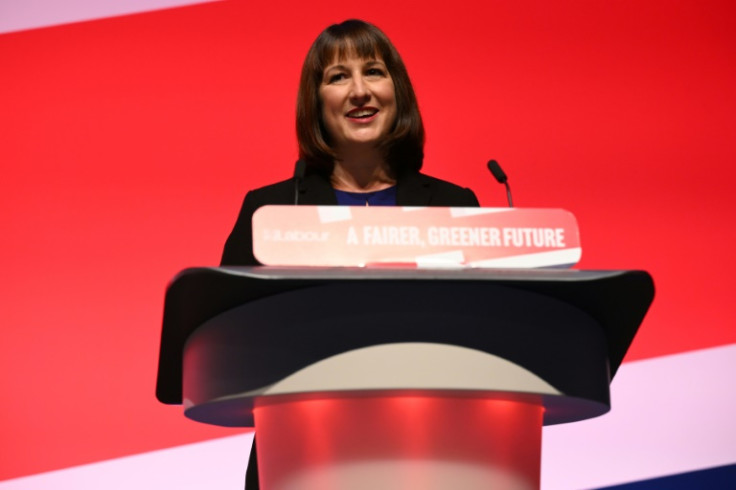Labour Strikes a Confident Note in Liverpool Despite the News of Turmoil in the Middle East
Rachel Reeves was in the limelight in Liverpool, described as the would-be "first female Chancellor ever in Britain", and also the "best qualified".

Labour's annual conference in Liverpool may have been overshadowed by news of the turmoil in the Middle East. Nevertheless, the leaders on the podium seemed like a government in waiting more than ever before; and the members seemed ready to present a united front.
The message was simple: "It's the economy, stupid", in the immortal words of James Carville, architect of Bill Clinton's successful first run at the White House.
Whether it was Rachel Reeves confidently asserting that the Conservatives seemed to have started behaving like the opposition already, or the plethora of detailed new policies and specific reviews Labour announced, this was very much a leadership group waiting in the wings.
Reeves, whose profile the party has worked hard to raise in recent months, came on stage to a glowing introduction by retail guru and Cameron-era government advisor, Mary Portas, who said Reeves would not only be the first female chancellor in 800 years of parliamentary history, but also "the best qualified Chancellor that Britain has ever had."
In her conference speech, the shadow chancellor promised to cut waste and drive growth. She said she would speed up projects like battery factories and 5G infrastructure. She pledged to increase the national living wage "taking into account the real cost of living", but stopped short of an amount.
Although the Labour leadership avoided commitments on HS2, Reeves promised an independent inquiry into the project.
In a particularly well-received policy intention, Reeves said she would levy VAT on private school fees.
She said she would hire 300 new planners across the public sector and rewrite clunky planning guidance. Ms Reeves also vowed to establish an anti-corruption commissioner aimed at recovering money lost as a result of fraud and waste during the pandemic.
The conference struck a decidedly more upbeat tone than that of the Tories' disharmonious, if not downright dejected sojourn in Manchester.
This was marred by the Prime Minister's HS2 announcement, as well as divided by Liz Truss's appearance, which was noted with barely constrained disdain by Rachel Reeves in Liverpool.
Last but not least, the conference featured the appearance of former UKIP leader and ex-Tory, Nigel Farage – with whom a number of young Tories seemed anxious to take a selfie or two, noting that in their view, he had made politics less "boring".
Back to Liverpool then, where even as Labour delegates disagreed with the leadership, the dissent was borne with equanimity. For instance, when the delegates overwhelmingly voted in favour of the critical infrastructure motion, proposed by the Unite and Aslef unions, to the effect that the National Grid's electricity and gas networks should be brought into public ownership.
In addition, they also stated that HS2 should be restored, with both legs, to Manchester and Leeds, intact.
As The Guardian noted, the leadership did not put much effort into voting down these motions, which passed – and the delegates did not mind much that the motions had no chance of being implemented in practice.
On the economy, Reeves managed to secure some hefty endorsements. Perhaps the biggest was in the form of a video message from former Bank of England governor, Mark Carney: "Rachel Reeves is a serious economist. She began her career at the Bank of England so she understands the big picture.
"But, crucially, she understands the economics of work, of place and family. And, look, it is beyond time we put her energy and ideas into action."
Carney's blessing was all the more remarkable given he is a close ally of George Osborne, who pulled out all the stops to ask the Canadian to accept the top job at the Bank.
Reeves' speech also managed to bag the approval of both the Confederation of British Industry (CBI) and the Trade Unions Congress (TUC), making for perhaps unusual allies, in a promising sign of wide-ranging appeal.
The CBI chief executive, Rain Newton-Smith, said:
"Businesses will be encouraged to hear the shadow chancellor speak so ambitiously about driving up business investment and committing to tackle some of the key blockers.
"Business(es) need certainty and stability in areas like tax, regulation, planning and policy. Businesses will welcome the focus on planning and infrastructure delivery."
For his part, Paul Nowak, the TUC general secretary, said: "Working people need an economy that delivers for all – not just a wealthy few. But the Tories have failed them. They have presided over the longest pay squeeze in modern history, anaemic growth and an explosion in insecure work.
"Labour's plan for decent work and increased investment will rebuild our infrastructure hand in hand with unions and employers, and deliver the economic growth and boost to living standards this country has been crying out for."
Labour also made it a point to emphasise that there are more business leaders at the conference than union leaders. The party said 300 CEOs and chairpersons are registered to attend, with many left on the waiting list.
Keir Starmer told a business forum at the conference that he foresees a "partnership" between business and the incoming government.
In focussing on the economy, Labour has stepped firmly onto territory that is traditionally a Conservative stronghold. Despite today's confetti-filled interruption of Starmer's speech by a protester, they are looking confident, breezily batting away both Conservative attempts at critique and internal disagreements.
© Copyright IBTimes 2025. All rights reserved.





















